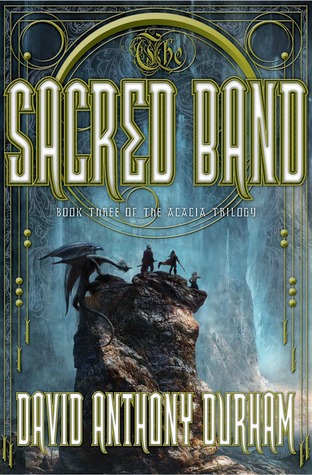The Sacred Band is the third book in David Anthony Durham’s Acacia trilogy. Spoiler warning: this review assumes that you’ve read the first two books, Acacia: The War with the Mein and The Other Lands. If you haven’t read them yet and want to read a spoiler-free review of the first book, there’s an excellent one by Kate Nepveu here. If you have read them and would like to refresh your memory, you can check out my posts here and here.
Short summary of this review: The Sacred Band is a solid conclusion to the Acacia trilogy. If you liked the first two books, I’m sure you’ll like The Sacred Band.
The most pleasant surprise about The Other Lands, the previous book in the trilogy, was that it broadened the scope of this series so much. Ushen Brae, the setting for a large part of the action in that book, proved to be a complex and interesting place, with its non-human Auldek tribes, several strata of human Quota slaves (from a warrior caste to an organized “Free People” resistance movement), the mostly extinct Lothan Aklun race, and a rich and fascinating history. The Sacred Band doesn’t expand the series’ fantasy world to the same extent as The Other Lands did, although it does reveal some inland areas of Ushen Brae that were previously unseen. Rather than expanding the world, The Sacred Band instead builds on what came before, reveals a few new and interesting details, and brings the various plot lines to a satisfying conclusion that, at the same time, leaves the door open for possible future stories set in this world.
As The Other Lands ended, the Known World seemed poised on the brink of climactic change. Queen Corinn’s magic had grown stronger and stronger, culminating in the shocking resurrection of her brother Aliver. The newly freed Santoth were on their way north, claiming that Corinn’s magic posed a threat to the world. The League of Vessels still had its claws in various plots, despite the failure of its Ushen Brae gambit. Mena had been given a task that seemed impossible and borderline suicidal: halt or at least slow the advance of the Auldek, who were marching across the frozen north with a huge army to invade the Acacian empire. And Dariel was still in Ushen Brae with the Free People, who thought he might be their savior, the Rhuin Fá.
Does The Sacred Band bring all of these threads to a satisfactory conclusion? Yes, with the caveat that your level of satisfaction with this series closer will depend on how sensitive you are to the issues that plagued the previous books. My chief complaint is still that David Anthony Durham occasionally relies on highly improbable coincidences and surprise revelations to advance his plot. I’m staying intentionally vague to avoid spoilers here, but in The Sacred Band there’s one major instance where an (up to that point) unknown ability miraculously and completely changes the tide. It’s really a shame that an otherwise well written and original fantasy series has to resort to this, because it tarnishes its many positive aspects.
Aside from this, The Sacred Band is easily the strongest novel in the trilogy. By now, both the characters and the fantasy world have acquired a surprising amount of depth. On the Acacian side, there’s a melancholy atmosphere throughout the early parts of the book, as characters lead their lives with the knowledge that their world is about to change drastically. If they felt that they were more or less in control in the last book, they now become more and more aware of how untenable the situation really is. Meanwhile, the Auldek army is advancing, and their chapters reveal a few more surprising sides to the Auldek culture. And as the various plots advance, we also learn more details about the League of Vessels, who continue to play a complex game, and about the Free People and their history. All through the novel, Durham advances the plot while still occasionally revealing new layers of his fantasy world.
In the end, The Sacred Band is a rewarding book because it shows some of its major characters finding their destinies in ways that have considerably more resonance than anything that came before in the series. I think it’s safe to say that, if you’ve been following these characters’ story arcs with interest, you’ll be surprised, occasionally shocked, and ultimately satisfied with the way their stories come to an end. This trilogy started out with characters that were little more than templates, but puts them through so many changes and evolutions that, by the end, they’ve become unrecognizable and infinitely more interesting.
Looking back, I feel that this trilogy has steadily been getting better as it progressed. Acacia: The War with the Mein had an uninspired start, but improved significantly after the end of its first section. The Other Lands added a whole new dimension to the fantasy world and continued to grow and evolve the characters in surprising ways. And as I hoped and expected, The Sacred Band continues this trajectory and delivers a worthy finale that more than makes up for some of the bumps along the way. If you enjoyed the first two books in this trilogy, this is practically a must-read.
Stefan Raets reads and reviews science fiction and fantasy whenever he isn’t distracted by less important things like eating and sleeping. Many of his reviews can be found at Fantasy Literature.










